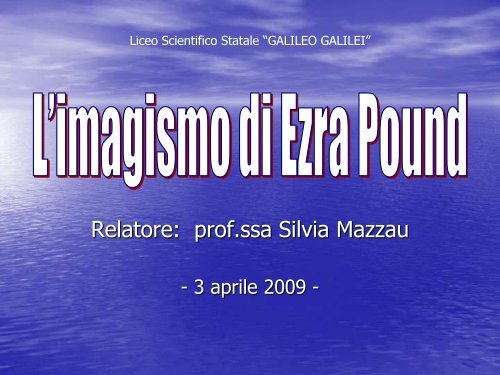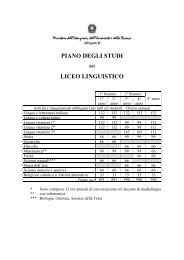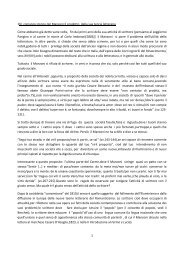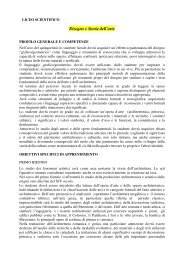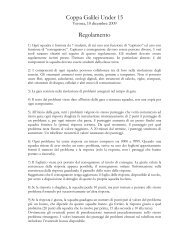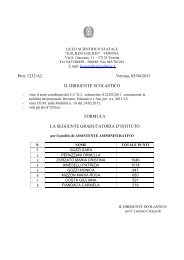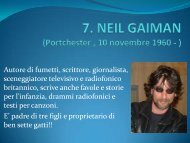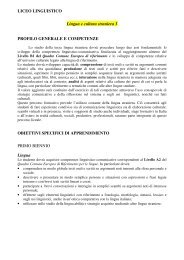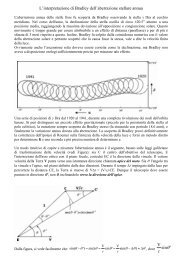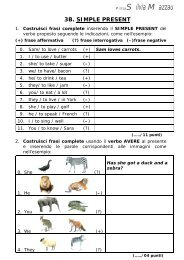L'imagismo di Ezra Pound - Liceo Scientifico Galilei
L'imagismo di Ezra Pound - Liceo Scientifico Galilei
L'imagismo di Ezra Pound - Liceo Scientifico Galilei
Create successful ePaper yourself
Turn your PDF publications into a flip-book with our unique Google optimized e-Paper software.
<strong>Liceo</strong> <strong>Scientifico</strong> Statale “GALILEO GALILEI”<br />
Relatore: prof.ssa Silvia Mazzau<br />
- 3 aprile 2009 -
<strong>Ezra</strong> <strong>Pound</strong> (1885 – 1972)<br />
• 1885: <strong>Ezra</strong> <strong>Pound</strong> nasce a<br />
Hailey nell'Idaho da una<br />
famiglia <strong>di</strong> Puritani del New<br />
England.<br />
• 1898: compie il suo primo viaggio in<br />
Europa con la famiglia e ne torna<br />
entusiasta.<br />
2
<strong>Ezra</strong> <strong>Pound</strong> (1885 – 1972)<br />
• 1905: consegue la laurea in<br />
Arts and Letters presso<br />
l’Università della Pennsylvania<br />
(Hamilton College)<br />
• 1906: ottiene una borsa <strong>di</strong><br />
stu<strong>di</strong>o e torna in Europa<br />
3
<strong>Ezra</strong> <strong>Pound</strong> (1885 – 1972)<br />
• 1908: al rientro in America,<br />
dopo quattro mesi <strong>di</strong> attività<br />
come docente <strong>di</strong> letteratura<br />
spagnola e francese presso<br />
l'Università dell'In<strong>di</strong>ana (Wabash College),<br />
è invitato a dare le <strong>di</strong>missioni per il suo<br />
stile <strong>di</strong> vita troppo fuori dalle regole.<br />
S'imbarca per l'Europa con 80 dollari in<br />
tasca convinto che l'optimum per uno<br />
scrittore sia possedere solo ciò che entra<br />
in due valigie: a Londra <strong>di</strong>viene presto il<br />
centro della vita letteraria della città. 4
<strong>Ezra</strong> <strong>Pound</strong> (1885 – 1972)<br />
• 1910: tornato nuovamente<br />
in America per poco tempo<br />
contribuisce a rendere la<br />
rivista letteraria Poetry una delle più<br />
influenti sulla poesia moderna. Su<br />
questa rivista saranno pubblicati gli<br />
articoli programmatici più<br />
significativi dei poeti Imagisti.<br />
5
<strong>Ezra</strong> <strong>Pound</strong> (1885 – 1972)<br />
• 1911: in Europa visita tutti<br />
i principali centri culturali<br />
– Londra, Parigi, Venezia – e<br />
pubblica anche i suoi primi libri <strong>di</strong><br />
poesia. Conosce, poi, ed aiuta in tutti<br />
i mo<strong>di</strong>, artisti <strong>di</strong> tutti i settori,<br />
compresi i musicisti.<br />
6
<strong>Ezra</strong> <strong>Pound</strong> (1885 – 1972)<br />
• 1913: la vedova del grande<br />
filologo Ernest Fenellosa gli<br />
affida i manoscritti del marito,<br />
stimolo principale per il suo<br />
approccio al cinese che lo porterà<br />
alla trasposizione <strong>di</strong> numerose<br />
liriche <strong>di</strong> quel lontano paese.<br />
7
<strong>Ezra</strong> <strong>Pound</strong> (1885 – 1972)<br />
• 1914: <strong>di</strong>venta segretario del<br />
poeta irlandese W.B. Yeats,<br />
e impone la pubblicazione<br />
delle prime poesie <strong>di</strong> T.S. Eliot che a<br />
lui, “ il miglior fabbro”, de<strong>di</strong>cherà “The<br />
Waste Land” per i consigli, le critiche e<br />
le correzioni fornitegli. Intanto si<br />
concentra sull'elaborazione dei<br />
leggendari "Cantos" (o "Canti Pisani")<br />
8
<strong>Ezra</strong> <strong>Pound</strong> (1885 – 1972)<br />
• 1925: si trasferisce a Rapallo<br />
fino al 1945 dove si de<strong>di</strong>ca ai<br />
"Cantos" e alle traduzioni <strong>di</strong><br />
Confucio, intensifica gli stu<strong>di</strong><br />
<strong>di</strong> economia e la sua polemica contro le<br />
manovre economiche internazionali.<br />
Entra in politica, esprime <strong>di</strong>sprezzo per le<br />
democrazie occidentali, paura verso la<br />
Russia comunista, ammirazione per il<br />
Fascismo sotto la “guida illuminata” <strong>di</strong><br />
Mussolini e feroce antisemitismo.<br />
9
<strong>Ezra</strong> <strong>Pound</strong> (1885 – 1972)<br />
• 1941: tentato invano il rimpatrio<br />
tiene una celebre serie <strong>di</strong> <strong>di</strong>scorsi<br />
alla ra<strong>di</strong>o. Accusa l’ America <strong>di</strong><br />
corruzione, nelle mani <strong>di</strong> finanzieri Ebrei<br />
in complotto per “<strong>di</strong>struggere la civiltà<br />
occidentale”. Frasi come «Adolf Hitler<br />
era una novella Giovanna d'Arco, un<br />
santo. Egli era un martire. E come molti<br />
martiri, portò con sé visioni estreme.»<br />
non gli verranno perdonate.<br />
10
<strong>Ezra</strong> <strong>Pound</strong> (1885 – 1972)<br />
• 1945: prelevato il 3 maggio da<br />
due partigiani, è trasferito a Pisa<br />
presso la polizia militare dopo<br />
quin<strong>di</strong>ci giorni <strong>di</strong> interrogatori.<br />
Per tre settimane è rinchiuso in una<br />
gabbia <strong>di</strong> ferro, esposto al sole <strong>di</strong><br />
giorno e ad accecanti riflettori <strong>di</strong> notte:<br />
ne conseguirà un esaurimento nervoso.<br />
Gli viene poi concesso <strong>di</strong> scrivere e<br />
finisce <strong>di</strong> comporre i “Cantos".<br />
11
<strong>Ezra</strong> <strong>Pound</strong> (1885 – 1972)<br />
• 1946: trasferito a Washington<br />
e <strong>di</strong>chiarato tra<strong>di</strong>tore, viene<br />
richiesta per lui la pena <strong>di</strong><br />
morte ma al processo è <strong>di</strong>chiarato<br />
infermo <strong>di</strong> mente e rinchiuso per do<strong>di</strong>ci<br />
anni nel manicomio criminale <strong>di</strong> St.<br />
Elizabeth.<br />
12
<strong>Ezra</strong> <strong>Pound</strong> (1885 – 1972)<br />
• 1947: iniziano petizioni <strong>di</strong><br />
scrittori ed artisti da tutto il<br />
mondo e insistenti proteste contro la sua<br />
detenzione resa, per altro, sopportabile<br />
dal primario dell’ospedale, suo grande<br />
ammiratore, che gli consente <strong>di</strong> vivere in<br />
una stanza singola in cui scrive tre libri,<br />
riceve visite da celebrità letterarie e gode<br />
<strong>di</strong> relazioni coniugali ed extraconiugali.<br />
13
<strong>Ezra</strong> <strong>Pound</strong> (1885 – 1972)<br />
• 1949: gli viene assegnato il<br />
prestigioso Premio Bollinger<br />
per i suoi “Cantos”.<br />
• 1958: considerato “un malato <strong>di</strong> mente<br />
inguaribile” ma “non pericoloso per la<br />
società” viene liberato e si trasferisce<br />
presso la figlia a Merano. Partecipa a<br />
numerose attività artistiche e letterarie,<br />
mostre, convegni internazionali.<br />
14
<strong>Ezra</strong> <strong>Pound</strong> (1885 – 1972)<br />
• 1967: molte vecchie certezze<br />
sembrano averlo abbandonato<br />
e in un’intervista ad Allen Ginsberg si<br />
scusa <strong>di</strong> quello "sciocco e provinciale<br />
pregiu<strong>di</strong>zio dell'antisemitismo".<br />
• 1972: il 1 novembre muore nell'adorata<br />
Venezia, dove è tutt’oggi sepolto, dopo<br />
alcuni anni <strong>di</strong> quasi totale – voluto –<br />
silenzio e isolamento.<br />
15
L’Imagismo (1)<br />
• E’ una corrente letteraria nata e <strong>di</strong>ffusasi<br />
negli USA e nel Regno Unito nei primi<br />
anni del Novecento.<br />
• In rottura con la tra<strong>di</strong>zione poetica tardo<br />
romantica gli imagisti si rifanno alle<br />
in<strong>di</strong>cazioni del critico inglese T.E. Hulme<br />
ispirandosi ai simbolisti francesi e alla<br />
poesia cinese e giapponese.<br />
16
L’Imagismo (2)<br />
• <strong>L'imagismo</strong> sostiene la necessità <strong>di</strong> un<br />
linguaggio poetico conciso, chiaro,<br />
semplice, essenziale, scarno, basato<br />
sulla precisione e l'imme<strong>di</strong>atezza con cui<br />
si presentano le immagini (the "things", le<br />
"cose"), privo <strong>di</strong> <strong>di</strong>vagazioni o mezzi<br />
termini.<br />
17
L’Imagismo (3)<br />
• Le poesie imagiste sono quin<strong>di</strong> oggettive<br />
e stilizzate, svincolate dalla metrica<br />
regolare, scritte in verso libero.<br />
• La narrazione non segue un filo<br />
cronologico ma procede attraverso<br />
continui spostamenti nel tempo.<br />
18
L’Imagismo (4)<br />
• Nel 1913 <strong>Pound</strong> pubblica A Few Don'ts<br />
by an Imagiste sulla rivista letteraria<br />
Poetry dando la definizione del termine<br />
immagine intesa come “that which<br />
presents an intellectual and emotional<br />
complex in an instant of time” vale a <strong>di</strong>re<br />
ciò che presenta un complesso<br />
intellettuale ed emotivo in un istante nel<br />
tempo.<br />
19
L’Imagismo (5)<br />
• <strong>Pound</strong> prosegue <strong>di</strong>chiarando che “It is<br />
better to present one Image in a lifetime<br />
than to produce voluminous works”, cioè è<br />
meglio presentare una sola Immagine nel<br />
corso <strong>di</strong> una vita piuttosto che produrre<br />
opere voluminose.<br />
20
L’Imagismo (6)<br />
• Lo stesso numero della rivista contiene<br />
anche il testo Imagisme, opera del<br />
poeta e critico F. S. Flint (grande<br />
sostenitore del verso libero e della<br />
poesia francese moderna) con tre<br />
<strong>di</strong>chiarazioni succinte sulla posizione<br />
degli imagisti:<br />
21
L’Imagismo (7)<br />
1. Direct treatment of the "thing,"<br />
whether subjective or objective cioè<br />
trattamento <strong>di</strong>retto della “cosa”, sia<br />
essa soggettiva od oggettiva.<br />
22
L’Imagismo (8)<br />
2. To use absolutely no word that does<br />
not contribute to the presentation<br />
quin<strong>di</strong> non utilizzare assolutamente<br />
alcuna parola che non contribuisca<br />
alla presentazione.<br />
23
L’Imagismo (9)<br />
3. As regar<strong>di</strong>ng rhythm: to compose in<br />
sequence of the musical phrase, not<br />
in sequence of the metronome vale a<br />
<strong>di</strong>re relativamente al ritmo: comporre<br />
nella sequenza della frase musicale,<br />
non nella sequenza del metronomo.<br />
24
Lustra (1916)<br />
La raccolta <strong>di</strong> poesie imagiste intitolata<br />
Lustra viene pubblicata da <strong>Pound</strong> nel<br />
1916 e si apre così:<br />
“And the days are not full enough And<br />
the nights are not full<br />
enough And life slips by like a field mouse<br />
Not shaking the grass.”<br />
25
In a Station of the Metro (1)<br />
“Three years ago in Paris I got out of a<br />
„metro' train at La Concorde, and saw<br />
suddenly a beautiful face, and then<br />
another and another, and then a<br />
beautiful child's face, and then<br />
another beautiful woman…” (E.<strong>Pound</strong>)<br />
26
In a Station of the Metro (2)<br />
“…and I tried all that day to find<br />
words for what this had meant to me,<br />
and I could not find any words that<br />
seemed to me worthy, or as lovely as<br />
that sudden emotion. And that<br />
evening… I was still trying, and I<br />
found, suddenly, the expression...”<br />
27
In a Station of the Metro (3)<br />
“…I do not mean that I found words,<br />
but there came an equation... not in<br />
speech, but in little splotches of<br />
colour. It was just that - a `pattern',<br />
or hardly a pattern… a word, the<br />
beginning, for me, of a language in<br />
colour…”<br />
28
In a Station of the Metro<br />
The apparition of these faces in the crowd;<br />
Petals on a wet, black bough.<br />
L‟apparizione <strong>di</strong> questi volti nella folla;<br />
Petali su un ramo bagnato, nero.<br />
29
In a Station… - analisi (1)<br />
The /apparition/ of /these/ /faces in the<br />
crowd/<br />
Station – of the Cross (tra<strong>di</strong>z. cristiana)<br />
Metro – metropolitana <strong>di</strong> Parigi<br />
apparition – comparsa <strong>di</strong> un’immagine /<br />
miracolo possibile per tutti<br />
these – esperienza passata / attuale,<br />
del poeta / <strong>di</strong> tutti<br />
30
In a Station… - analisi (2)<br />
…/faces in the crowd/<br />
/Petals/ on a /wet, black/ bough.<br />
faces in the crowd – “splotches of colour”<br />
petals – caducità dell’uomo<br />
wet, black – acqua/pioggia e oscurità<br />
31
Alba<br />
As cool as the pale wet leaves<br />
of lily-of-the-valley<br />
She lay beside me in the dawn.<br />
Fresca come le pallide foglie bagnate<br />
del giglio-della-valle<br />
Ella giaceva al mio fianco nell’alba.<br />
32
Alba - analisi<br />
As /cool/ as the /pale/ /wet/ leaves<br />
of /lily-of-the-valley/<br />
She lay beside me in the /dawn/.<br />
cool – frescura rigenerante<br />
pale – pallore / purezza<br />
wet – acqua / rigenerazione / purificazione<br />
lily – bianco / purezza<br />
dawn – aurora / rinascita<br />
33
The Garret (1^ parte)<br />
Come, let us pity those who are better off than<br />
we are.<br />
Come, my friend, and remember<br />
that the rich have butlers and no friends,<br />
And we have friends and no butlers.<br />
Come, let us pity the married and the unmarried.<br />
34
La soffitta (tr. 1^ parte)<br />
Su, compatiamo quelli che sono più ricchi <strong>di</strong><br />
noi<br />
Su, amico mio, e ricorda<br />
che i ricchi hanno maggiordomi e nessun<br />
amico,<br />
E noi abbiamo amici e nessun<br />
maggiordomo<br />
Su, compatiamo gli sposati e i non sposati.<br />
35
The Garret (2^ parte)<br />
…Dawn enters with little feet<br />
like a gilded Pavlova<br />
And I am near my desire.<br />
Nor has life in it aught better<br />
Than this hour of clear coolness<br />
the hour of waking together.<br />
36
La soffitta (tr. 2^ parte)<br />
… L‟alba entra con pie<strong>di</strong> piccolini<br />
come una Pavlova dorata<br />
E io sono vicino al mio desiderio.<br />
Né la vita ha in sé qualcosa <strong>di</strong> meglio<br />
Di quest‟ora <strong>di</strong> chiara frescura<br />
l‟ora del nostro risveglio insieme.<br />
37
The Garret - analisi (1)<br />
Come, let us /pity/ those who are better off than<br />
/we/ are.<br />
Come, /my friend/, and remember<br />
that /the rich have butlers and no friends/,<br />
And we have friends and no butlers.<br />
Come, let us pity the married and the unmarried.<br />
Garret – povertà (del poeta?)<br />
pity – non invi<strong>di</strong>a ma compassione<br />
we – il poeta e un amico, <strong>di</strong>versi dagli altri<br />
the rich – aristocratici <strong>di</strong> Londra senza amici<br />
38
The Garret - analisi (2)<br />
…Dawn enters with little feet<br />
like a /gilded Pavlova/<br />
And /I / am near my /desire/.<br />
Nor has life in it aught better<br />
Than this hour of /clear coolness/<br />
the hour of waking /together/.<br />
gilded Pavlova – ricchezza e delicatezza<br />
I – il poeta entra in prima persona<br />
desire – l’amico/a è l’amata<br />
clear coolness/together – felici isolati<br />
39
Conclusioni<br />
• <strong>Pound</strong> è stato un uomo della sua epoca con i<br />
suoi chiari ( la poesia ) e i suoi scuri<br />
( l’antisemitismo e le sue tendenze politiche<br />
fasciste ).<br />
• La sua vita è stato il frutto <strong>di</strong> tutto ciò:<br />
ha avuto il riconoscimento che merita un<br />
letterato ma ha anche pagato <strong>di</strong> persona<br />
per le sue posizioni razziste.<br />
40
Un suo augurio conclusivo…<br />
“Questo è il mio consiglio ai giovani:<br />
avere curiosità.”<br />
“Se un uomo non è <strong>di</strong>sposto a<br />
lottare per le sue idee, o le sue idee<br />
non valgono nulla, o non vale nulla<br />
lui.”<br />
41
L‟imagismo <strong>di</strong> <strong>Ezra</strong> <strong>Pound</strong><br />
GRAZIE PER AVER PAZIENTEMENTE<br />
SOPPORTATO...<br />
la presentazione è scaricabile da<br />
http://www.silviamazzau.eu/<br />
public/<strong>Ezra</strong><strong>Pound</strong>.pps<br />
42


